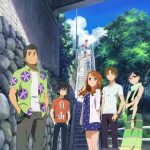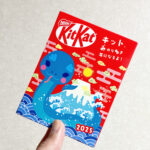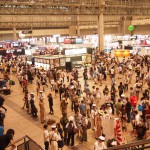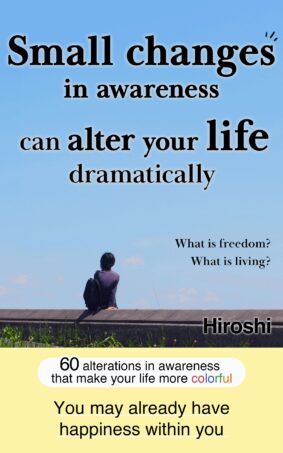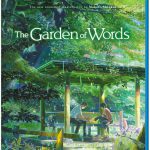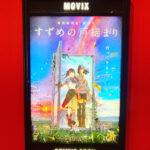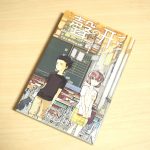The Garden of Words (Kotonoha no Niwa): Beautiful Tanka (Poem) and Quotes
Narukamino Sukoshitoyomite Sashikumori Amemofuraranka Kimiwotodomemu.
Japanese poem called Tanka consists of five units 5-7-5-7-7.
Thirty‐one syllables is the rule.
Its very origin is in 712, since then people enjoy Tanka.
Above Tanka was originally composed by Hitomaro Kakinomoto in Manyoshu (Collection of Ten Thousand Leaves).
Manyoshu is said to be the oldest existing collection of Japanese poetry,
And now murmured by teacher of classical Japanese Yukino who is heroine in the film “The Garden of Words”.
Actually I think most Japanese people including I could not understand the real meaning of it.
Well, maybe only those who read or study classical Japanese usually could understand it.
But even though I could not understand it, I felt beauty of the words.
I felt like I could not understand the words themselves but could understand words in my heart.
Here I take 2 Tanaka, one is composed by teacher Yukino and the other is by Takao, with some other quotes in the film.
- 1. Tanka Yukino Murmured
- 2. Tanka Takao replied
- 3. Quotes
- 3.1. You thought “She is crazy lady”, don’t you, It’s OK
- 3.2. I realized I was praying for rain
- 3.3. Am I still all right?
- 3.4. I became not able to walk properly, without noticing
- 3.5. But I did not want rainy season to end, actually
- 3.6. I am 27 but I don’t feel that I got smarter compared to myself 12 years ago
- 3.7. Now might be the happiest moment I’ve ever lived
- 3.8. Not Yukino-san but teacher, right?
- 3.9. I was practicing walking there, to be able to walk alone
- 3.10. You live on like that alone
- 3.11. I was being rescued there by you
- 3.12. I realize now, I was learning how to walk as well
- 4. Summary
Tanka (Poem) Yukino Murmured
“鳴る神の 少し響みて さし曇り 雨も降らんか 君を留めむ”
“A faint clap of thunder, Clouded skies, Perhaps rain comes, If so will you stay here with me?”
“Naru” means “roaring” in this situation and “kami” is “Japanese deity”, so it implies “thunder”.
“Sukoshi” is “little” or “small”.
“Toyomite” is very archaic style and have no trace of its original form at all now but it means “echo or “sound”.
“Ame” is “rain”.
“Sashikumori” means “cloudy”.
“Kumori” of Sashikumori means “cloudy”.
“Amemofuraranka” implies “I wonder if it rains”.
So this is the“wish” of composer.
“Kimi” means “you”.
There are many forms to express you in Japanese such as “Anata”, “Kimi”, “Omae”, etc.
Kimi makes a bit cold expression if one use it casually without putting any thought into it but depends on the situation it becomes very beautiful and sophisticated word.
In this situation, Kimi is used not as “You” but as “Loved One”.
“Tomen” means “stop”.
We use Tomeru even now but in the old days especially in written words such as Tanaka Tomen was often used.
In short, I can translate like this.
Tanka (Poem) Takao replied
“鳴る神の 少し響くみて降らずとも 我は留らん 妹し留めば”
“A faint clap of thunder, Even if rain comes or not, I will stay here, Together with you.”
Here I cut translation of “Narukamino” and “Sukoshitoyomite” as they are same meaning I introduced above in Yukino’s phrase.
“Furazutomo” means “Even if there is no rain”.
“Ware” means “I” and like “You”, there are many phrase to express “I” such as “Watashi”, “Boku”, “Ore”.
Ware is archaic way of “Watashi”, I feel pride or confidence in oneself from this expression “Ware”.
Same Chinese character “留” is used for “Tomaran”.
Yukino used Tomen putting her wish into it but Takao used Tomaran here.
Well, technically speaking, it was wish of Hitomaro Kakinomoto (Original Composer) and it was their first meeting so I think Yukino doesn’t have a wish like “I want you to stay here with me”.
Tomaran implies his will and determination to stay.
Here, Takao replied using Tanka (It is called Kaeshi Uta, that is, replying poem) of Hitomaro Kakinomoto, too.
“Imoshi” is also the word no longer has its original form at all like the case of “Toyomite”.
Chinese character “妹” is used for it but it now means just younger sister “Imouto” in Japanese.
In this situation, Imoshi is not used in the meaning of younger sister of course.
Imoshi meant “Wife” or “Girl friend”, “Lover”.
“Todomeba” is “To stay”.
Chinese character “留” is used here again.
Even now we use todomeru (mainly only in written words and still it is rare to use this word in this meaning even in written words) and “Todomeru” means “Made or let something stay”.
“Imoshitodomeba” means “if you (special one) ask of my staying here”.
I can translate the Tanka like this.
Quotes
You thought “She is crazy lady”, don’t you, It’s OK, after all we human, each of us has something quirks, more or less
When Takao told Yukino for her having more healthy food other than beer, what she took out from her bag to show him is tons of chocolates.
It was interesting she used the word “Yabai”, because it is slung usually young people use.
It means “Terrible”, “Crazy”, “Dangerous”, etc. so not good meaning in this situation (But depends on the situation it becomes very good meaning like “Great”).
She never use slung, yes maybe part of the reason is she is a teacher of classical Japanese.
But this moment, I felt like she revealed his inner emotion using “Yabai”.
If Takao was just a stranger or not important person to her, she never used “Yabai” but for her Takao was important person whom talk anything like friend, so she used Yabai.
What I like about her quote is she said “After all, we human, each of us has something quirks”.
We tend to pretend to be cool or perfect in front of others and in public but actually every person has something quirks.
We tend to point out others’ strange behavior or habit but every person has something strange, more or less.
We are not perfect so I felt like she is saying “Please leave me alone and allow me as I’m not the only one!.
In the evenings, before I went to sleep, and in the mornings, in the moment I woke up, I realized I was praying for rain
Takao keeps meeting Yukino when it rains.
Rain was just his favorite weather before she met Yukino.
So certainly it was great for him to have a rainy day but not like always wising for it.
But he realized that he is wishing rain now.
Am I still all right?
She notices Takao was sleeping.
And whispers “Am I still all right?”
She would not have said this word if Takao had been awake.
Because it reveals her weakness or real feeling.
She said this word to Takao and to herself.
She whispered real emotion locked in heart.
Technically speaking, She said “ねぇ” in Japanese first and follows the words “Am I still all right?”
This “ねぇ” was a bit difficult for me to translate.
As certainly it means “Hey”,“Hello” or “Look” in English but that’s too direct translation and they doesn’t include fragile emotion it holds.
I became not able to walk properly, without noticing
She tells Takao when he measures her foot for making her shoes.
She did not say what it is exactly but tells Takao that she can not live, how can I say it, good, like before.
She tells she forgot how to live.
Takao asks “About your job?”
I think many people sympathizes what she told.
We could do well once but somehow we came to forget how we did it well.
We can not live well like before sometimes in this society.
She revealed part of her inner emotion although she did not say anything about it after that.
But I did not want rainy season to end, actually
Rainy season finished and hot summer started.
Rain was the only “excuse” Takao and Yukino met but no more rain now.
She says to herself “It was good not rain now because he doesn’t have an excuse to skip classes”.
And says “But I did not want rainy season ends, actually”.
This was her real feeling.
Takao was not just a student in school for her anymore but was special person.
I am 27 but I don’t feel that I got smarter compared to myself 12 years ago (15-year-olds) at all, I’ve always been here, stuck in the same place
Even sunny day, Yukino keeps going to the park.
She expected that she might happen to meet Takao even in sunny day again.
But was not.
She talks to herself “Here, on sunny day, is as if like completely another place”.
Without Takao, it was not the exact place she once knew.
And she keeps “I am 27 but I don’t feel that I got smarter compared to myself 12 years ago (15-year-olds) at all, I’ve always been here, stuck in the same place”.
I sympathize her.
Certainly now I might know many things and experienced so many things compared to what I used to be.
But did I really get smarter than when I used to be when I was child?
Did I really step further, grow up?
Her word makes me think what we are today.
Now might be the happiest moment I’ve ever lived
This phrase was of both Takao’s and Yukino’s.
When they enjoy talk over meal together, they suddenly felt like “This might be the happiest moment”.
They notice their real feeling deep inside.
Not Yukino-san but teacher, right?
Takao finally tells Yukino that he likes Yukino.
She also wanted to confess that she also liked him but she couldn’t.
Because she is the one who leaves school forever and she must have felt she can not take bright future from him.
He was still teenager and have a lot of chances to meet many people.
Her age and the situation prevented her from accepting his propose.
So she says “Not Yukino-san but teacher, right?”
In Japan we do not call our teacher using “San”.
We say just “Teacher” or “Teacher Yukino”.
Calling last name with san is not usual in relationship between teacher and student as it implies deep relationship beyond teacher and students.
(But in business or other situation, it is usual and just a polite expression to call someone with san)
She implies him that “We have no relationship like you can call me with san, I am just a teacher after all for you”.
I was practicing walking there, to be able to walk alone without shoes
She says she was just practicing walking there, that is, she went there just to adjust herself to society.
“Without shoes”, she says.
She tells Takao indirectly that she did not go there in the meaning of meeting him but just for herself.
It might be half true, but the other half was white lie of her.
She says “Thank you Akizuki-kun”.
You live like that alone forever
Takao left the room and Yukino cried alone.
She made face of adult saying “I am teacher” but what she really wanted to say was opposite.
She remember days spent with Takao in the garden.
And finally remember what Takao replied to her poem.
“A faint clap of thunder, Even if rain comes or not, I will stay here, Together with you.”
She ran out of the room without wearing her shoes.
She rush down the stairs barefoot and finally caught up with Takao, who was looking at the rain falls.
When he saw Yukino he says “I do not like you”.
He says “You knew that I’ll never live up to my expectations, never measure up to my dreams from the first!, Then why you did not tell me directly. Why you did not tell me You kid should go to school, You (kid) are just disturbing”.
Then he shouts “You are always like that, you never say what’s important, pretending that it’s not your problem, and live on like that, alone!!”
The moment, her inner emotions bursts out and she hugs him tightly.
I was being rescued there by you
She reveals everything with tears.
She was very afraid of going to school.
She tried and decided to go school every mornings after wearing suits but couldn’t.
And says, going to the garden, meeting with Takao, “she was saved”, she was being saved by Takao there.
This was the moment Yukino threw away all the superficial faces and revealed how much she suffered, how much she loved him.
I realize now, I was learning how to walk as well
Later, Takao also says to himself that he was also the one who was learning how to walk.
It was not only Yukino but also Takao learning how to live there.
Both of them were being saved each other there.
They both were needed place and someone to live well once again.
He concludes “I haven’t mastered the steps, I also fall. But I’m on my path, I’ll go see her one day when I mastered the steps to go further”.
Summary
It was really beautiful story as well as animation.
I felt like I was watching real scene in Shinjuku.
The set of The Garden of Words is Shinjuku Gyoen Park.
I myself visit there about once or twice a year
It is really big park and very beautiful.
You can enjoy beautiful sakura in Spring, and beautiful colors of red, orange and yellow in Autumn.
And of course, you can find the small wooden house Yukino and Takao stayed in front of the pond.
Here are some pictures and video when I visited Shinjuku Gyoen Park at Sakura season in 2017.
Cherry Blossom Festivals Tokyo 2017
Actually teacher is very hard job and I still remember a teacher was crying alone in class when I was in junior high.
It was not my class but other class.
I think she was almost same age as Yukino and all the students ignored her and left class on the day.
I do not know what happened but students can be like that and it is true some teachers get depression and leave school in the end.
Sorry for being too personal but it was good Yukino was saved by Takao in the end.
Do you want to know afterwards of Yukino?
She appears in the film “Your Name (Kimi no Na wa)” as a teacher of Mitsuha (Heroine).
“Your Name” and “The Garden of Words” are both films by director Makoto Shinkai.
I also wrote a bit about Yukino in the article here.
Your Name Kimi no Na wa Movie of Makoto Shinkai became a Mega Hit
You might surprise but even Takao appears in the film but it is just 1 second so very hard to find.
He passes Mitusha at 1:33:06 in Blu-ray. (It is in Japanese Ver. so the time might a bit different depends on the country or film aired)
You might already know about the film but if not, I really recommend you to watch it, too!!
Official Website
http://www.kotonohanoniwa.jp/
Meaning of Suzume no Tojimari in English
Your Name Kimi no Na wa Movie of Makoto Shinkai became a Mega Hit
RADWIMPS make English songs for Your Name that will be shown in US and Canada
PS. I have my store selling rare, unique Japanese goods in eBay (Following is the link to my store)
https://ebay.us/uFJMri


